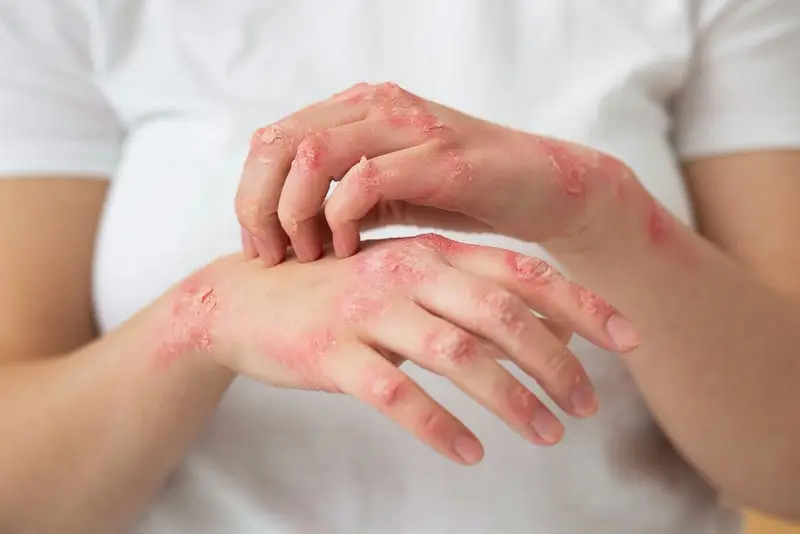Home Everything You Need to Know About Eczema? Symptoms, Causes, Treatment

Everything You Need to Know About Eczema? Symptoms, Causes, Treatment
Eczema is one of the most common skin conditions seen by community doctors. It is a condition that causes the skin to become dry, cracked, and itchy.
Do you ever feel annoyed by the itchy, red, and uncomfortable skin that comes with eczema? You're not alone! Eczema is a common skin problem that affects many people worldwide. In this guide, we'll talk about eczema in a simple way, covering its symptoms, causes, and ways to treat it. Let's start this journey to learn and handle eczema for a healthier, happier you.
Understanding Eczema:
Eczema, or atopic dermatitis, is a long-lasting skin problem that can bother people of all ages, starting usually during childhood. It happens when a mix of family traits and things in the environment messes with your skin, making it a bit tricky to deal with. People with eczema have skin that's not as good at protecting itself, so it's easier for things like irritants and allergens to cause trouble.
Eczema Symptoms:
Recognizing eczema involves understanding a set of signs that show up on your skin. Here's what you might notice:
Itching: Eczema usually brings along strong itching, and scratching it can make things worse.
Rash: Look out for a special red or brownish-gray rash in certain areas like your face, hands, feet, and behind your knees.
Dry Skin: If your skin feels very dry, it might be more prone to irritation, a common thing in eczema.
Inflammation: Swelling and redness are common with eczema, making you feel uncomfortable.
Cracking and Oozing: In serious cases, your skin might crack, ooze, or even form crusts, making the situation more complicated.
Secondary Infections: Scratching can create open sores, increasing the chance of getting a bacterial or viral infection.
Understanding these signs is the first step towards dealing with eczema. If you notice these symptoms, it's a good idea to talk to a healthcare professional for advice on how to manage and treat your eczema.
Eczema Causes:
Understanding the eczema causes can help in managing and preventing flare-ups. Here are some simple explanations for the factors contributing to eczema:
-
Genetics: If someone in your family has had eczema, asthma, or hay fever, you might be more likely to develop eczema.
-
Environmental Factors: Things like pollen, pet dander, and certain foods in your surroundings can make eczema worse or trigger it.
-
Skin Barrier Dysfunction: Think of your skin as a protective wall. When this wall is weakened, irritants can easily get through, making eczema symptoms worse.
-
Immune System Response: Your immune system, which usually fights off harmful things, might become too active, contributing to eczema development and persistence.
-
Microbial Factors: Certain bacteria on your skin can also play a role in how eczema develops.
Understanding these factors can help you make choices that keep your skin happy and healthy. If you're unsure about your symptoms, it's always a good idea to check with a healthcare professional.
Eczema Treatment:
To make life with eczema more manageable, we use different treatments that aim to ease discomfort and improve your overall well-being. Here's a simple breakdown:
Anti-Itch Creams: We have special creams that help calm the redness and itching. Think of them like superheroes fighting the irritation on your skin.
Keep Your Skin Happy with Moisturizers: Imagine your skin as a garden, and moisturizers are like watering it regularly. This helps to prevent dryness and reduces the chances of eczema acting up.
Say Goodnight to Itching with Antihistamines: Sometimes, eczema makes us itch at night. Antihistamines are like friendly sleep aids, helping you relax without scratching.
Detect and Dodge Triggers: Just like you avoid rainy puddles if you don't want wet shoes, we avoid specific things that can make eczema worse. It could be certain foods or things in the environment.
Sun Power for Good: A bit of sunlight can be like a natural healer. But it's like a superhero that needs supervision, so we do it in a controlled way with a doctor's help.
Serious Help for Serious Cases: In really tough situations, when eczema is like a stubborn villain, we have special medicines that work with your immune system to bring things under control.
Remember, managing eczema is like caring for a garden – with the right tools and a bit of attention, we can keep it flourishing and make you feel better. If you ever feel unsure, your superhero team (doctors) is here to help.
Easy Tips for Managing Eczema:
Be Kind to Your Skin: Use mild, fragrance-free cleansers and moisturizers. These help keep your skin hydrated without causing irritation.
Cool Off in Lukewarm Water: Hot water can take away your skin's natural oils, making it even drier. Opt for lukewarm water to be gentle on your skin.
Go Comfy with Cotton: Wear loose and comfy cotton clothes. This helps minimize irritation and lets your skin breathe.
Chill Out to Manage Stress: Stress can make eczema worse. Try relaxing activities like meditation and yoga to keep stress in check.
Spot Allergens Around You: Identify and control things that trigger your eczema, like pet dander, pollen, or certain foods.
Check-in Regularly: Keep in touch with your healthcare provider regularly. They can help monitor your eczema and adjust your treatment plan if needed.
Following these simple steps can make managing your eczema a breeze!
In summary, knowing about eczema is crucial for taking good care of your skin. If you notice any itching, rashes, or dryness, it might be eczema. Find out what makes it worse and try different treatments to feel better. Talk to a doctor for a plan that's just right for you.
Keep in mind, that dealing with eczema is a process, not a quick fix. Stay informed, be watchful, and take small steps towards healthier skin and a happier you.








